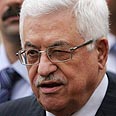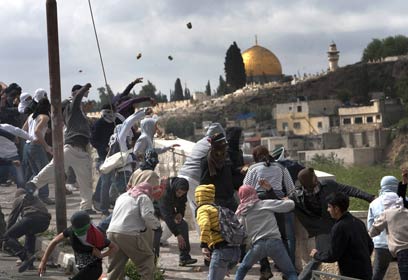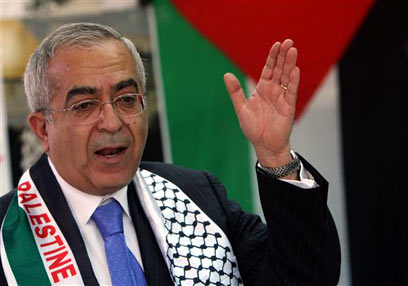
PA politicians choose state building over struggle, for now
West Bank streets quiet as Gaza rallies in support of Jerusalem riots. In light of deadlock in peace talks, return to terrorism not on table as upper echelons in Palestinian Authority focus on Fayyad-model state building over path of intifada. Third option of supporting bi-national state small, but gaining momentum
The alert declared Tuesday among Palestinian security forces, especially among the police forces deployed throughout Palestinian Authority cities, sends a clear message. The PA is not interested as of now in a conflict of any sort with Israel – not a "rock intifada," not "popular resistance," and certainly not armed conflict.
Indeed, the "day of rage" riots were concentrated mainly in Jerusalem and were accompanied by support rallies in the Gaza Strip as the streets of the West Bank remained quiet.
Though voices in the Palestinian camp calling for a wide-scale national struggle in the territories based on the model of the clashes that take place every Friday in Naalin and Bilin or the one currently underway in Jerusalem, PA leadership still remains cautious, preferring to first exhaust the political route.
There should be no mistake. When the Palestinians say "political route," they don't mean the negotiations with Israel slated to get started in the "proximity talks" on which there is a broad Palestinian consensus that they will lead nowhere.
They mean building PA institutions in a move that will ultimately, they hope, show their accomplishments to the international community in order to receive recognition of an independent Palestinian state. This way, the Palestinians presume, world powers will lead the fight over the borders of such a state, and not its mere existence.
'No one wants to suffer'
As for now, no one in the upper echelons of the PA is willing to start a new armed intifada like the al-Aqsa Intifada that broke out in September 2000. Palestinian President Mahmoud Abbas himself has spoken out on a number of occasions against the option of armed intifada, and this is the opinion currently prevailing among PA leaders – not another armed struggle.
The PA is also successfully dealing with Hamas' badgering on this matter by pointing out that in actuality Hamas, too, is not giving the go ahead for an armed struggle or rocket firings from the Strip.
But this isn't all. The Palestinians may not admit this publicly, but it has recently become clear that the opposition to armed struggle does not translate into official support for a popular struggle that could spread to other West Bank hot spots.

'Rage day riots' in Jerusalem (Photo: AFP)
Abbas and Palestinian Prime Minister Salam Fayyad may from time to time express their support for the "resistance" in Naalin and Bilin that is extolled in Palestinian media. Lower ranking PA officials, such as Ahmed Qureia on Monday, have not hesitated to make open calls to start an intifada and resistance committees have started organizing on the ground. However, Abbas remains wary and even declared that the Palestinians will not start a new intifada despite the growing frustration with the political deadlock on peace talks.
"What is happening today is letting off steam, but only to a certain extent," said a PA security official to Ynet. "As of now, there is no plan to let that line be crossed. The people have suffered for years, and no one has any interest in bringing back to the same situation despite calls made by senior officials in the organizations and committees to start a struggle, which could easily receive international support."
Trying to stabilize the regime
However, beyond the desire to avoid suffering, concerns for escalation stem first and foremost from the desire to allow the model drafted by Fayyad together with Abbas to focus on building the institutions of a "state in the making" within the coming months so that they can produce results within a year as institutions that can maintain a country. This plan has received growing support from the international community, the EU in particular.
The PA has marked the beginning of next year as target date for evaluating this model. In light of the deadlock in peace talks that is expected to continue, the PA will present the international community with a challenge to recognize an independent Palestinian state.

Fayyad. Broad support within international community (Photo: AP)
"The international community, via the Security Council, will have to decide if we did everything required of us in terms of stabilizing the systems, building institutions, conducting affairs far from corruption, and erasing anarchy in all its forms in order for the world powers to lead the fight over the borders of the country, and not over its mere existence," said a Palestinian minister to Ynet. "This is the leading approach today in the PA."
"Israel's declared objective," he claimed, "is to drag us into a conflict in order to delay state institution building. If there is one clear strategic decision in the PA, it is the decision to build the state alongside maximum maneuvering through pressure from organizations, hurdles and schemes placed by Israel, and the pressure of public opinion.
"We are on the path to a clear end point: to come to the international community in a year and say, 'We are ready for a state of our own. We did it with your direction, assistance, financing, and oversight. We did not break the rules, and we did not change the rules of the game even when it was enticing."
The third way
On the seam between the political outlook and the armed outlook is a third way that believes that there is currently no chance for struggle, but seeks to keep a certain flame of struggle alive in the form of popular resistance. This group also does not believe that the Israelis are interested in making progress in negotiations, and nor will they let the Palestinians build their institutions to the level of being prepared for an independent state.
Those espousing this viewpoint recommend that the PA adopt the discourse of a bi-national state. Though only a few Palestinian politicians currently embrace this approach, more and more Palestinians are claiming that it seems like the only serious solution on the table.
The debate surrounding a bi-national state is taking place mainly in the halls of Palestinian academia, but estimates are that this approach will gain more and more momentum as more people come to the conclusion that the model of a two-state solution has passed from this world. From the Palestinian perspective, the two main indications of this are the continued building in the settlements and the security fence.










